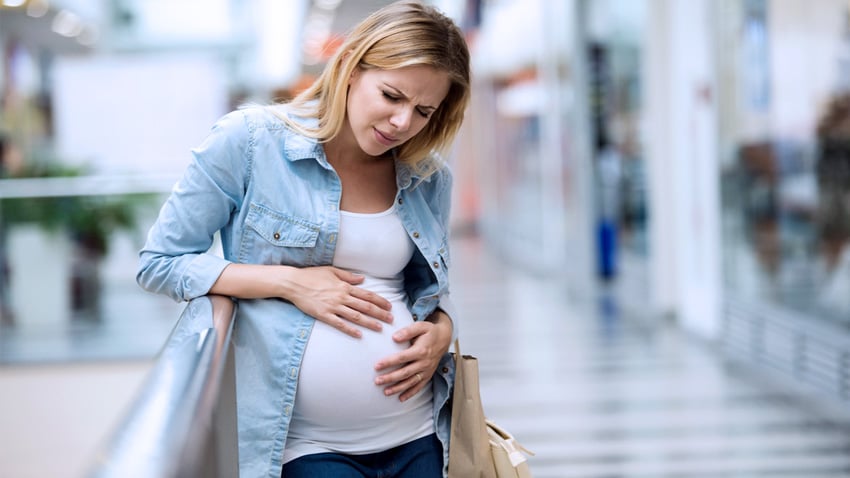Can Pregnant Women Menstruate?
The short answer is no. Menstruation and pregnancy are mutually exclusive events, meaning pregnant women do not menstruate, and menstruating women are certainly not pregnant. There are no exceptions to this rule.
However, it is crucial to note that while pregnant women do not menstruate, they may experience episodes of vaginal bleeding during pregnancy. These bleeding can have various causes, but menstruation will never be among them.
This distinction is vital because if a pregnant woman experiences bleeding significant enough to be mistaken for menstruation, she could be facing complications in her pregnancy. While some benign causes of vaginal bleeding during pregnancy exist, reporting any bleeding to an obstetrician is essential.
You may believe pregnant women can have their period and even have personal examples of such instances. If so, we recommend reading this text thoroughly, as it will address all your questions (if at the end of this article, you still need convincing, leave a comment at the end of the text, we will be happy to answer any questions).
To fully comprehend the incompatibility between pregnancy and period, we must first explain what menstruation is and how it occurs.
What is Menstruation?
The innermost layer of the uterus wall is called the endometrium. Every menstrual cycle, the endometrium prepares to receive an embryo that might be formed. This process occurs through the proliferation of endometrial cells and the development of blood vessels responsible for supplying fluids and nutrients to the future fetus.
The uterus’s preparation for pregnancy occurs monthly, beginning on the first day of the menstrual cycle. This process is initially stimulated by the hormone estrogen and later by the hormone progesterone.
Suppose we perform an ultrasound during the first days of the menstrual cycle. In that case, we will observe a thin endometrium with a single layer less than 0.4 cm (0.15 in) thick and few blood vessels. As days pass, hormonal stimulation causes endometrial cells to multiply, forming new blood vessels.
In the cycle’s final phase, the endometrium becomes thick, with three layers, dense, abundant in blood vessels, and about 1.5 cm (0.6 in) thick—almost four times thicker than at the cycle’s beginning.
After ovulation, if the egg is not fertilized within approximately 24 hours, it degenerates, and the stimulus for estrogen and progesterone production ceases. Since there is no longer any possibility of pregnancy in this cycle, there is no reason for the body to maintain the uterus prepared for embryo implantation.
Without estrogen and progesterone, the thick endometrial wall loses its stimulus to proliferate, and the blood supply is suddenly cut off. Consequently, the endometrial wall begins to collapse, shedding endometrial tissue, mucus, water, and blood.
Thus, menstruation is the detachment of a significant portion of the uterus’s inner wall, which prepared itself throughout the menstrual cycle to receive an embryo that never formed.
For menstruation to occur, a woman must go through two phases:
- Produce increasing amounts of estrogen to induce ovulation and proliferate the endometrium.
- Ovulate and not be fertilized, as the absence of fertilization and the egg’s degeneration cause the end of hormonal stimulation, leading to the collapse of the uterine wall.
Note: When a woman uses the birth control pill, it uses hormones to trick the reproductive system, causing the endometrium to proliferate without, however, inducing ovulation. When the medication is stopped, the endometrium collapses, and the patient menstruates.
Why Doesn’t Menstruation Occur During Pregnancy?
When an egg is fertilized, the levels of estrogen and progesterone do not drop rapidly, as they would if the unfertilized egg degenerated. Instead, these hormone levels increase, ensuring that the endometrium remains thick and prepared to receive the embryo. This is a crucial point; if a woman were to menstruate after fertilization, the endometrium would be shed, making it incapable of receiving or sustaining the viability of the recently implanted embryo.
The second point is that once the embryo has implanted and is developing properly in the endometrium, a new hormone begins to be produced: human chorionic gonadotropin, also known by the acronym hCG.
One of the many roles of hCG is to signal to the maternal body that there is a developing baby. This means, among other things, that the ovary is “instructed” not to mature any more eggs, which, in practice, means that the woman does not ovulate throughout the entire period she is pregnant.
Therefore, since one of the basic requirements for menstruation is ovulation, if a woman does not ovulate or have the hormonal fluctuations of estrogen and progesterone that occur throughout the menstrual cycle, she does not have the necessary stimuli to menstruate every month.
But the main reason for the incompatibility of pregnancy with menstruation is much simpler than the hormonal mechanisms described above.
Consider this: if the embryo is implanted in the endometrial wall, which is where the placenta receives the essential blood supply for development, the embryo’s attachment would be jeopardized if the woman menstruated and the endometrial wall collapsed. In such a scenario, the embryo simply could not remain affixed to the uterus. This is akin to a painting being unable to stay hung on a wall that has been demolished; similarly, an embryo cannot maintain its connection to the uterus if the uterine wall has been torn down.
In summary, a pregnant woman does not have any of the necessary stimuli for menstruation to occur. Still, even if she did, this would mean the immediate end of the pregnancy because the embryo would be expelled along with the collapsed endometrial tissue as soon as she menstruated.
Some of you may be thinking: but I know women who bled during pregnancy; how is that possible?
As mentioned in the introduction of the text, not all vaginal bleeding is menstruation. There are various causes for bleeding in pregnant women, but none is menstruation.
Causes of Vaginal Bleeding in Pregnancy
There are several causes of bleeding during pregnancy. Up to one in five pregnant women have at least one episode of vaginal bleeding in the first 12 weeks of pregnancy. Some of these causes are harmless, but others can indicate serious problems in the pregnancy, such as the risk of miscarriage or ectopic pregnancy.
Among the benign causes of bleeding in pregnancy is the so-called implantation bleeding, which is a slight blood loss that can occur when the embryo implants in the endometrial wall. This bleeding, although very different from menstruation, is often confused with the period because it usually occurs around the 4th week of the menstrual cycle when the woman is expecting her period.
Bleeding without clinical relevance can also occur after a gynecological examination or sexual intercourse. These bleeding episodes occur because the vagina and cervix are more sensitive, with tissue changes and increased blood supply during pregnancy. Women with polyps or uterine fibroids may also have episodes of vaginal bleeding throughout pregnancy.
Delving into the realm of medical conditions, various gynecological infections, including gonorrhea, herpes, chlamydia, candidiasis, or other types of vaginitis, have the potential to irritate the vaginal mucosa. This irritation increases the likelihood of bleeding.
From the 20th week of pregnancy onwards, placenta previa (implantation of the placenta in front of the uterine exit) or premature placental abruption (when the placenta detaches from the uterus before the time of delivery) are common and concerning causes of vaginal bleeding.
Bleeding in pregnancy due to contraceptive pill use
Rarely, a woman may become pregnant even while taking the contraceptive pill. This usually occurs when the pill is taken incorrectly.
In these cases, the woman may inadvertently continue taking the contraceptive for several months. Due to the hormones in the medication, the pregnant woman may experience a small blood loss at the end of each pack, similar to her period.
However, this bleeding is not technically menstruation, and the blood loss is usually much less than usual.
Regardless of the cause, all bleeding during pregnancy should be promptly evaluated by an obstetrician. As already mentioned, there is no menstruation during pregnancy. If you are pregnant and experiencing vaginal blood loss, even in small amounts, do not assume everything is fine. Contact your doctor and let them decide whether the bleeding is a cause for concern.
References
- Bleeding during pregnancy – American College of Obstetricians and Gynecologists.
- Am I Pregnant? FAQs On Early Pregnancy – American Pregnancy Association.
- Physiology of the normal menstrual cycle – UpToDate.
- Overview of the etiology and evaluation of vaginal bleeding in pregnant women – UpToDate.
Author(s)
Pedro Pinheiro holds a medical degree from the Federal University of Rio de Janeiro (UFRJ) and is a specialist in Internal Medicine and Nephrology, certified by the State University of Rio de Janeiro (UERJ) and the Brazilian Society of Nephrology (SBN). He is currently based in Lisbon, Portugal, with his credentials recognized by the University of Porto and the Portuguese Nephrology Specialty College.








